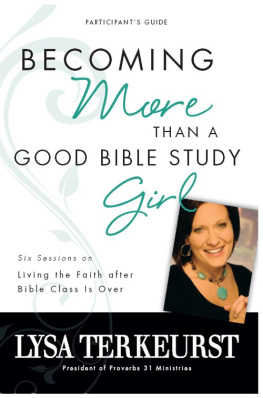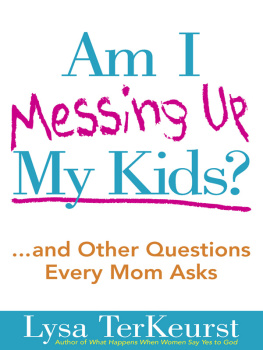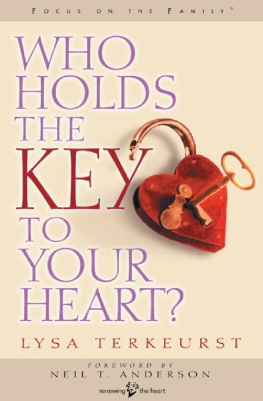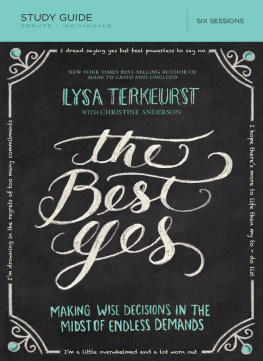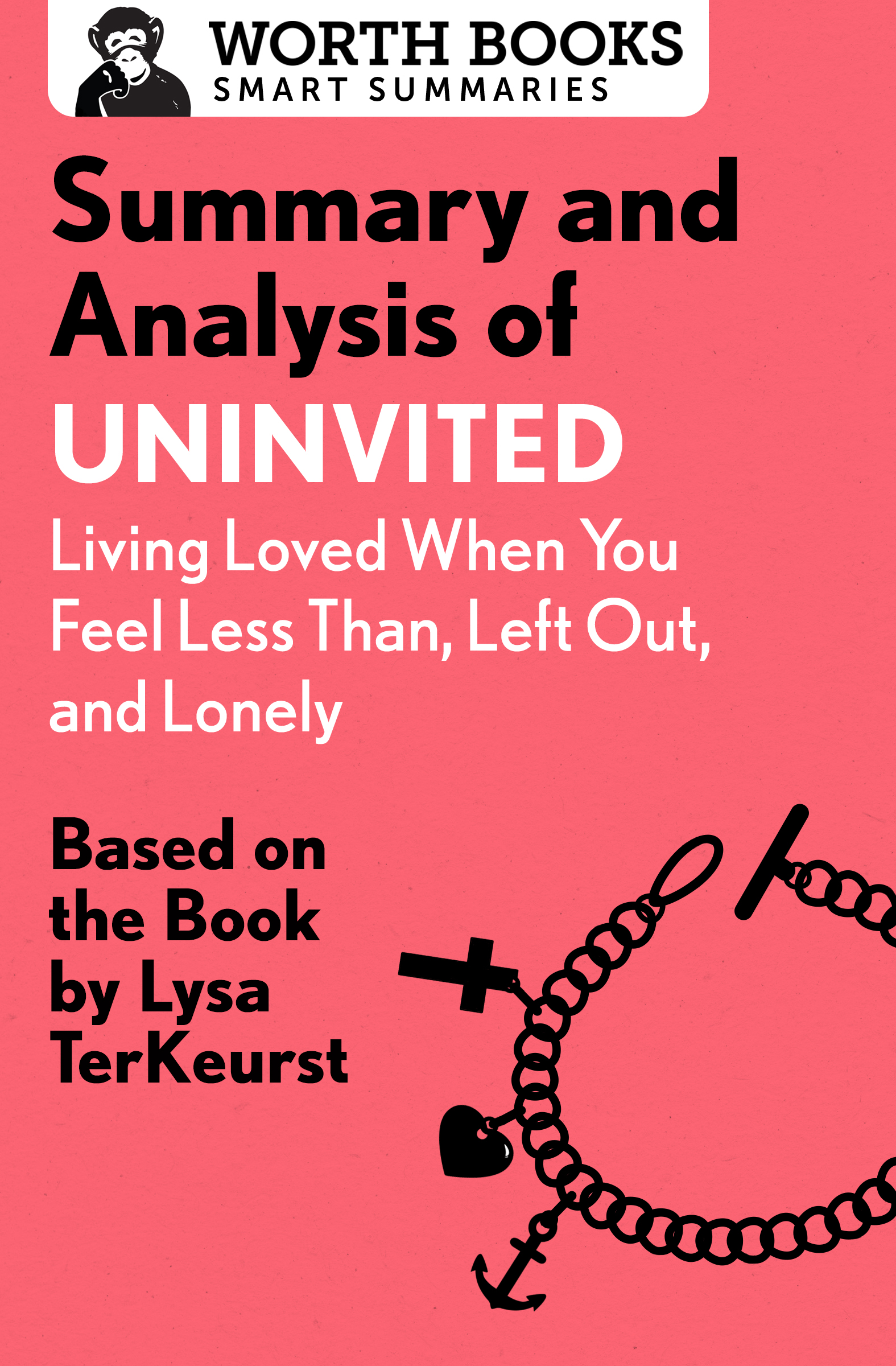Summary and Analysis of
Uninvited
Living Loved When You Feel Less Than, Left Out, and Lonely
Based on the Book by Lysa TerKeurst

Contents
Context
In Uninvited: Living Loved When You Feel Less Than, Left Out, and Lonely , author Lysa TerKeurst shares deeply personal stories of pain and loss in order to show readers how to get in touch with their true selves and become closer to God.
The self-help book especially resonates with women raising families in todays highly competitive, frenetic world. It lays out a practical road map to finding peace, security, and acceptance by using humor-filled anecdotes to connect real-life problems to Scripture. Uninvited explores such contemporary topics as how social media contributes to feelings of loneliness and isolation, the impact of assigning negative thoughts to others, and how to finally let go of the sins of the past.
Having spent many years working through her own feelings of rejection and fear, Lysa, the president of Proverbs 31 Ministries, passes on her tips for coping with lifes daily challenges, both big and small.
Overview
Uninvited: Living Loved When You Feel Less Than, Left Out, and Lonely is a God-centered self-help book dealing with rejection and the pain that follows in its footsteps. The book is a practical guide for dealing with difficult emotions. Lysa TerKeurst uses her own deeply personal experiences, folksy platitudes, and Biblical truths to help readers find their ways to healthier, happier places in life.
The book digs deep into the roots of rejection and offers helpful tools for overcoming obstacles and healing pain. Lysa recounts her own tragic childhood, during which her father abandoned the family, leaving her to believe she was at fault. A lot of the book touches on the authors still-raw emotions, underscoring how sometimes the heart may heal, but scars can remain forever.
Uninvited delves into the issues that women, in particular, face (such as defining worth by the judgments and acceptance of others) and that often lead to feelings of emptiness and self-loathing.
Encouraging readers to step out of the darkness and learn to live loved is a major premise of the book. Empowering women with a wide variety of practical tips on how to conquer the negative influences in their lives, Lysa also presents her readers with gifts in the form of passages from her favorite Bible stories, psalms, and affirmations.
Uninvited touches on subjects such as fear of abandonment, trust, loneliness, judgment (real and perceived), damaged relationships, loss, envy, failure, and insecurity. Ultimately, however, it ends on a high note, offering God-honoring practices women can easily apply to their daily lives.
Summary
Chapter 1: Id Rather Ignore Honesty
Self-loathing is poisonous. It encourages us to take on rejection (or perceived rejection) from others. Memories of past rejection can incite reactions that are blown out of proportion, making us fear the worst. When we internalize critical words, they soon become labels that we apply to ourselves. In the end, we wonder if we might actually deserve the feelings of inadequacy.
Being honest about who you are, however scary that sounds, is the only way to live a happy life. Facing honesty and looking deep insides ourselves can stir up traumatic memories, but cultivating honesty and thinking deeply about past rejections and pain encourages the real us, not the edited and protected versions we often choose to show the world. When we stop lying about who we are, we dare to be better people. And only from a place of honesty can we accept Gods love.
Need to Know: Avoiding honesty leads to strained relationships, missed opportunities, and feelings of inadequacy and rejection.
Chapter 2: Three Questions We Must Consider
When she was a child, Lysa was abandoned by her father, which left her feeling rejected and broken. Who was she if she was no longer a fathers daughter? And how could she love herself if her father didnt even love her? Two very common human fears, abandonment and loss of identity, had come into Lysas life. To survive, she buried her feelings and did her best to be a good girl. She made friends and did well in school, yet she never felt safe and secure.
We often anchor our identities on our relationships with peers and find happiness and self-worth from likes and comments on social media. But this only sets us up for an emotional house of cards; we are lulled into feelings of safety supported by a flimsy foundation.
Only through becoming intimate with God can we find security in our identity. God is always stable, he is always honest, he is always good and unchanging.
The way to developing an intimacy-based identity begins with these three questions: Is God good? Is God good to me? Do I trust God to be God?
God is good. He created the world with love and goodness. The ugliness we see nowmurder, disease, relationship breakdownswas not part of his good design, but was introduced by the sin of Adam and Eve. When God returns to rid the world of sin, his goodness will set the world right again, but in the meantime, we must trust his goodness, and we must trust that he is always there for us. When the Holy Spirit is inside us, our spirit is comforted. Once we know God is good and good to us, we know that God is good at being God. If we can sit silently in the face of pain and trust that he will come through for us, we will be comforted. Its possible to replace old thoughts and beliefs that hurt us with a new identity that helps us leave the painful past behind.
Need to Know: No matter what rejection is laid upon us, it cant trump Gods love.
Chapter 3: Theres a Lady at the Gym Who Hates Me
Lysa decides a woman at the gym hates her based only on the face she once made. When the lady smiles at her several weeks later, she realizes the hatred was imagined. We often feel judgments that are not based on fact and accentuate our feelings of rejection. We arent mind readers.
The solution to this problem is to strive to live loved. A wonderful sentiment, but easier said than done, right? Lysa begins by making a list of things shes grateful for, but after watching the news, the gratitude she feels is quickly replaced by guilt. Next, she plans to help others in need, hoping her love and blessings will come back to her. But thats not living honestly; thats manipulation. Love is not a bargaining tool. Living loved cant be achieved without authenticity and must come from a place of quiet surrender to Gods love. To find his love, we must slow down, be patient, and let his love cover us like a warm towel fresh out of the dryer. Living loved means being full of his love. We feel full when we want what he wants, when we fill our heart with his heart. We feel stable when we tap into his constant power. Remember, each of us was created by God, who formed us because he loves us. Gods love isnt based on us; its placed on us. And that place is where we should live, loved.
Need to Know: If you want to live loved you must come from an authentic, honest, and holy place.
Chapter 4: Alone in a Crowded Room
Attending a party with strangers can make us feel alone and uncomfortable. But its not only a crowded room of unfamiliar faces that stokes our feelings of anxiety and rejection, we can also feel unconnected and lonely among our friends, loved ones, and colleagues. Lysa reminds us that, proximity and activity dont always equal connectivity.









